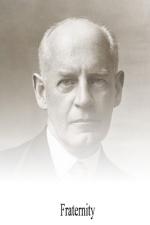There was something different in her look at Hilary. It had lost some of its childish devotion; it was bolder, as if she had lived and felt, and brushed a good deal more down off her wings during those few days.
“Mrs. Dallison told me to come,” she said. “I thought I might. Mr. Creed told me about him being in prison.”
Hilary made way for her, and, following her into Mr. Stone’s presence, shut the door.
“The truant has returned,” he said.
Hearing herself called so unjustly by that name, the little model gushed deeply, and tried to speak. She stopped at the smile on Hilary’s face, and gazed from him to Mr. Stone and back again, the victim of mingled feelings.
Mr. Stone was seen to have risen to his feet, and to be very slowly moving towards his desk. He leaned both arms on his papers for support, and, seeming to gather strength, began sorting out his manuscript.
Through the open window the distant music of a barrel-organ came drifting in. Faint, and much too slow, was the sound of the waltz it played, but there was invitation, allurement, in that tune. The little model turned towards it, and Hilary looked hard at her. The girl and that sound together-there, quite plain, was the music he had heard for many days, like a man lying with the touch of fever on him.
“Are you ready?” said Mr. Stone.
The little model dipped her pen in ink. Her eyes crept towards the door, where Hilary was still standing with the same expression on his face. He avoided her eyes, and went up to Mr. Stone.
“Must you read to-day, sir?”
Mr. Stone looked at him with anger.
“Why not?” he said.
“You are hardly strong enough.”
Mr. Stone raised his manuscript.
“We are three days behind;” and very slowly he began dictating: “’Bar-ba-rous ha-bits in those days, such as the custom known as War —–’” His voice died away; it was apparent that his elbows, leaning on the desk, alone prevented his collapse.
Hilary moved the chair, and, taking him beneath the arms, lowered him gently into it.
Noticing that he was seated, Mr. Stone raised his manuscript and read on: “’—–were pursued regardless of fraternity. It was as though a herd of horn-ed cattle driven through green pastures to that Gate, where they must meet with certain dissolution, had set about to prematurely gore and disembowel each other, out of a passionate devotion to those individual shapes which they were so soon to lose. So men—tribe against tribe, and country against country—glared across the valleys with their ensanguined eyes; they could not see the moonlit wings, or feel the embalming airs of brotherhood.’”




